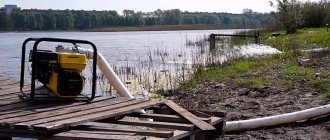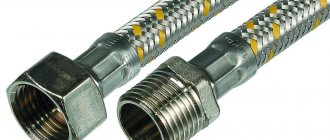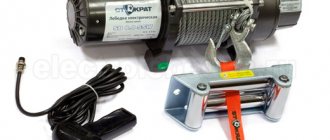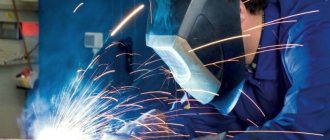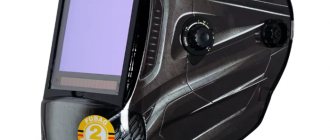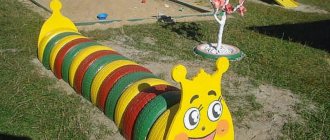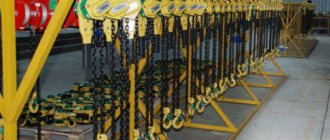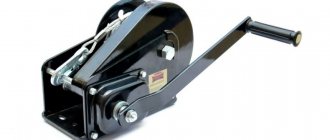A fire motor pump is a device that supplies water to extinguish a fire. It consists of a frame on which a centrifugal pump and an internal combustion engine or electric motor are mounted. Its main difference with general purpose motor pumps is the high water pressure.
Portable motor pumps for fire extinguishing have a fairly wide range of applications. They are often used for pumping water in flooded basements, pits, buildings, as well as for draining wells, for collecting dirty water from drainage pits and septic tanks, watering plants in agriculture, and more. All this is possible thanks to the autonomous engine.
There are a huge number of high-pressure fire motor pumps on sale. It is important to decide for what purposes you need it. In this article we will look at the main characteristics of motor pumps, as well as some of their types.
Technical characteristics of motor pumps
If you decide to purchase a fire motor pump for your site, then first of all you need to decide on the scope of its application. Motor pumps differ according to the following criteria:
- Suction depth. If you are using a unit to drain wells or pits, you need to determine the maximum depth, and then select the appropriate equipment. This parameter is also necessary when drawing water from reservoirs;
- Performance. This characteristic is measured in liters pumped per minute;
- Pressure If you use a motor pump to water your garden plot, then based on its size you will be able to select a machine with a suitable horizontal water supply range.
A motor pump for extinguishing a fire also has another important parameter - fuel consumption. Household units with low productivity do not consume more than 2 liters of fuel, but for high-performance models this figure can reach 5 liters per hour.
Motor pumps can have two types of pumps:
- centrifugal. It is used to work with clean or slightly contaminated water. The word “fire department” is not an indicator that this is special equipment, but only that the equipment develops high pressure in the pressure part. It is used not only to extinguish fire, but also to supply water over long distances. Perfect for areas located at a great distance from a water source. Often, such pumps are equipped with a four-stroke gasoline or diesel engine; productivity can reach up to 600 liters per minute with a lift height of 60 meters;
- membrane is suitable for working with dirty and heavily contaminated water. Such units have greater productivity, as well as the ability to pass solid debris measuring 2.5 centimeters in size. The device is designed in such a way that you can easily reach the pump to extract particles larger than its capacity. Capacity is 2000 liters per minute with a lift height of 35 meters.
Types and description
Types of motor pumps
All such mobile devices for extinguishing fires can be divided into types according to the method of placement, movement/transportation, type of pump drive motor; purity of water with which they can work:
- Gasoline - driven by a carburetor/injection engine that uses various brands of gasoline as fuel.
- Diesel - driven by a diesel engine unit, which have a higher engine life, but are louder than gasoline models of devices.
On the Russian market, Tohatsu domestically produced Vepr high-pressure diesel devices Koshin with gasoline-powered engine units manufactured by Honda .
- Portable, mobile. The first ones are mounted on a supporting frame, which provides the ability to: be carried by two people manually, for transportation by vehicle in the back, trunk, or trailer; loading/unloading, installation on a hard surface - dense soil in a fire break near a reservoir, asphalt, concrete surface of a road, fire driveway.
The latter are installed on the frame of a single-axle trolley with wheels, which allows one person to move it on a flat hard surface, but does not exclude the possibility of carrying it by two or more members of the police department, employees from the duty personnel of enterprises and organizations.
Handles on the frame of portable and mobile devices must be protected with heat-insulating material.
- Trailed. This type of firefighting motor pumps is installed on the frame of car trailers, in accordance with their carrying capacity, equipment standards/rules, and cargo transportation. It is trailed motor pumps that are often additionally equipped with devices for dosed supply of a foam solution, which allows the use of guns and generators to extinguish a fire with foam. It is recommended, if necessary, to use all available trailed and portable models of devices, because this provides more opportunities to provide access to the fire.
- High-pressure (high pressure). According to GOST 53332-2009, motor pumps used to extinguish fires, depending on the design and main technical parameters, are divided into normal pressure devices - up to 2 MPa, and high pressure devices - above 2 MPa.
If for extinguishing, according to regulatory requirements, the inclusion of solid particles in water should not be more than 0.5%, and their size should be up to 3 mm, then a fire motor pump for dirty water, purchased for use by utilities, engineering services of enterprises, construction contractors for pumping, draining basement floors, wells, trench pits, allows, by selecting a membrane pump type, the device to collect and pump water with large inclusions - up to 25 mm or more for some product models.
How to choose a fire motor pump?
First, you need to decide for what purpose you need this technique. To water or irrigate the garden, there is no need to purchase a heavy-duty unit. You can take a closer look at models with a capacity of 130 liters per minute and a lifting height of 7 meters.
If you want to create a water supply in your home using this technique, then you need a machine with a capacity of at least 500-800 liters per minute and a lifting height of 35 meters.
If you are draining an area or pumping out a septic tank, the mud motor pump should have the following parameters: productivity - 1000 liters per minute, lift height - 20-25 meters.
Fire motor pumps differ by type of fuel: gas, gasoline and diesel. The first two are similar to each other. In addition, a gasoline unit can be easily converted into a gas unit by installing a special design for this.
It is also worth noting that gasoline motor pumps are best suited for summer residents. They have a four-stroke engine and low noise. However, gasoline consumption is quite high, and you will also get a short service life. Another great option is gas units. Such fuel is cheap and its consumption is minimal.
Diesel engines are suitable for a large number of long-term jobs. Such a fire pump will cost more, but its service life is much longer.
Design and principle of operation
Structural elements of motor pumps and the operational tasks they solve:
- Rigid frame with insulated handles for easy carrying or caravan chassis. Some models are equipped with a closed housing, which reliably protects structural elements from mechanical damage, but makes maintenance and repair difficult.
- Engine running on diesel fuel or gasoline. Ensures the functioning of the pump.
- The pump is centrifugal in models for clean water or diaphragm, used for viscous media. With its help, water or solution is collected and supplied to the destination.
- A fuel tank, the volume of which determines the continuous operation time of the equipment.
- Reservoir for foaming agents with dosing devices.
- Mesh filters installed on the suction hose. Their task is to prevent too large inclusions from entering the working chamber of the pump. The mesh size of the filter element is determined by the technical parameters of the pump used.
- A set of fire-fighting equipment, which includes hoses, connecting elements, and barrels.
Motor pump MP-600
The number “600” means that the pump is capable of pumping 600 liters of water per minute, and the water supply pressure can reach a distance equal to the height of a five-story building.
Main characteristics:
- The pump device is located in a welded frame, which has handles for carrying. There are also devices that are moved on a trailer;
- single-cylinder two-stroke engine;
- fuel tank with a volume of 12 l;
- suction depth is 5 m, and the width of the suction opening is 8 centimeters;
- weight - about 60 kg.
We also need to mention the fire motor pump Deva MP600 with the following characteristics:
- Rosenbauer single-stage centrifugal pump. Capacity - from 500 to 1100 liters per minute with a suction height of 1.5 to 3 meters. Maximum suction height - 7.5 m;
- two-stroke four-cylinder Briggs & Stratton engine running on gasoline with a capacity of 12 horsepower;
- fuel tank volume - 8.5 l;
- weight - 58 kg.
General design features and principle of operation
The common design features of motor pumps of both Russian and foreign production is the presence of the following elements in the equipment of such devices:
- drive motor;
- pump;
- a metal frame that performs a load-bearing function and protects all structural elements of the pump from vibration vibrations;
- fuel tank, the capacity of which determines how long the firefighting motor pump can operate without interruption (models with a fuel tank capacity of at least 6 liters have fairly good operating time without refueling).
Portable fire motor pump device
Most modern models of motor pumps are equipped with strainers installed on the suction hose. The purpose of such a filter is to prevent too large particles of solid inclusions contained in the pumped liquid from entering the working chamber of the pump. The size of the filter cells, depending on the technical characteristics of the pumping unit installed on the equipment, can vary within fairly wide limits.
An important parameter of autonomous fire pumps is the diameter of the outlet socket to which the hose for the motor pump is connected. For many models, the internal diameter of the outlet socket is 10 cm, which allows you to create a good pressure of liquid pumped by a device with average productivity.
Fire motor pump installation diagram
Some models of firefighting motor pumps are equipped with closed-type housings, which allows for more reliable protection of structural elements from mechanical damage. Meanwhile, closed-type housings limit access to the structural elements of the pump, which somewhat complicates its maintenance and repair.
A gasoline or diesel motor pump works in the same way as an electric pumping unit. The main difference between such devices is the type of motor that drives the pump itself. Equipping with a gasoline or diesel drive engine makes the fire motor pump completely autonomous, capable of operating in places where there is no centralized power supply.
» data-lazy-type=»iframe» src=»data:image/gif;base64,R0lGODlhAQABAIAAAAAAAP///yH5BAEAAAAALAAAAAABAAEAAAIBRAA7″>
Motor pump MP 800
The fire motor pump MP 800 is used to extinguish fires, and is also widely used for watering fields and vegetable gardens, for pumping water from basements, wells, and flooded rooms.
Main characteristics:
- productivity - 800 l per minute;
- head - 60 m;
- suction height - 5 m;
- two-stroke gasoline carburetor engine with a capacity of 20 horsepower;
- weight - 68 kg.
Areas of application
Firefighter motor pumps are very popular among representatives of public utilities, owners of agricultural and construction companies, as well as among owners of dachas and private houses. The most common tasks that a fire motor pump can effectively solve include:
- elimination of fire sources;
- liquidation of the consequences of floods and flood situations;
- eliminating the consequences of accidents in water supply and sewerage systems;
- organization of plant watering;
- pumping water from flooded basements and cellars;
- drainage of construction pits and trenches;
- pumping water from natural and artificial reservoirs, underground and above-ground reservoirs;
- flushing wells and well shafts before using them or after long-term operation.
Modern fire motor pumps are in no way inferior to civilian equipment in terms of equipment and often surpass it in reliability
If we talk about highly specialized areas of application of fire motor pumps, this includes pumping water from the holds of ships, caves, grottoes, as well as tanks for any other purpose.
Let's summarize everything said above. A fire motor pump can be successfully used in all situations where it is necessary to quickly organize pumping out water or extinguishing fires.
Motor pump MP 1600
Another type of fire pump, which is widely used in agriculture. It is trailed, and its main task is to supply water over long distances. It is perfect for places with a remote water source.
Main characteristics:
- four-stroke engine ZMZ-24-01;
- productivity - 1600 l per minute;
- suction height - 7 m;
- head - 100 m;
- fuel tank volume - 45 l;
- weight - 660 kg.
Purpose and benefits
If in large settlements water is collected by mobile fire fighting vehicles from external water supply networks, then beyond their boundaries - from artificial fire reservoirs in the territories of separately located industries and warehouse complexes; from fire piers located on natural bodies of water.
Typically, there are no fire departments to protect small towns, villages, and industrial facilities located outside the city limits, and those that exist are located at distances of tens of kilometers.
Therefore, the forces that will have to fight possible fires are volunteers from among residents of rural, suburban settlements, gardening and dacha associations, and enterprise employees; and the only available, based on economic considerations, reliable means of eliminating fires and fires at the beginning of their development is a fire motor pump.
Purpose
- Implementation of uninterrupted intake and supply of water to eliminate fires and fires in the initial stage of development.
- Water supply from fire hydrants.
- For pumping water, filling tankers.
- For completing firefighting trains and ships.
The advantages of use include:
- Autonomy of devices.
- Mobility, which allows you to quickly deliver them to a fire reservoir, install them, and begin collecting and supplying water without additional preparations.
- Structural reliability.
- Ease of operation, technical service, and repair, which in practice is important for operation in areas far from large cities.
- In practice, fire motor pumps, in addition to work related to fire extinguishing, are actively and effectively used for the following types of work:
- For collecting and pumping water for irrigation of private land plots, fields of agricultural enterprises, for filling various reservoirs and containers.
- For draining flooded basements of construction sites, technical floors, pits, wells when eliminating accidents; construction pits.
Portable motor pump "Geyser" MP 20/100
The fire pump "Geyser" MP 20/100 differs from general-purpose equipment in its high pressure. It is used to extinguish fires, as well as in rural areas for needs on a personal plot.
Specifications:
- VAZ 21083 four-stroke petrol carburetor engine;
- flow - 20 l per second;
- head - 100 m;
- maximum suction height - 7.5 m;
- weight - 215 kg.
Hose equipment
The complete set of motor pumps includes elements that deliver chemical waste to the source:
- sleeves:
- suction;
pressure;
- trunks (fire hoses):
- compact jet;
spraying;
- universal (multi-mode);
- clamps, clamps;
- heads:
- transitional;
coupling;
- sleeve;
- pin;
- plugs;
- foam mixer, foam generator;
- keys for fittings;
- water collector, splitter;
- mesh to retain water in the suction line;
- hydraulic elevator (water jet ejector).
Operating rules
In order for the motor pump to operate without failures, it is important to follow the following recommendations for its operation:
- Place the unit strictly horizontally to prevent oil from flowing to one side. In this case, automatic blocking will work.
- Before starting work, pour some water into the chamber . This will prevent dry running. In models with protection, starting “dry” will not happen at all.
First start
After correct installation of the motor pump, you can start the process of pumping out the liquid:
- Install the suction pipe through the sealing gasket to the suction flange and tighten the nut.
- Push the suction hose all the way in.
- Immerse the suction hose in water.
- Fill the fuel tank with gasoline or a mixture of gasoline and oil (according to the instructions).
- Fill the pump chamber with water through the opening provided for this purpose.
- Close the air damper.
- Move the gas lever to the middle position.
- Press the carburetor fuel suction lever several times.
- Repeatedly sharply, but without jerking, pull the starting handle (magneto) towards you.
- Once the engine is running, fully open the choke in the direction indicated on the installation.
- Place the throttle lever in idle mode and warm up the engine for 15-20 seconds.
- Subsequently, use the gas control lever to switch the engine operation to the required mode.
The motor pump is turned off in the reverse order:
- Move the throttle lever to low gas and the air damper to the middle position.
- After 2 - 3 minutes of operation, turn off the fuel valve.
- When the carburetor is completely empty of fuel and the engine stalls, turn the main switch to the off position.
How to properly maintain
Like any technical equipment, a motor pump requires regular maintenance and service.
In order for the unit to work for a long time and properly, it is necessary to regularly carry out the following actions:
- Change of oil . It is necessary to regularly check the engine oil and top it up if necessary. According to the regulations, the first replacement is carried out after 20 hours of operation, then every 100 hours.
- Replacing air filters . According to the manufacturers' instructions for most motor pumps, the filter is replaced every 50 hours.
- Cleaning . After each use, the unit must be rinsed with clean water, especially if contaminated liquids have been pumped. If dirt dries inside the chamber, the motor pump may jam the next time it is started.
What kind of gasoline motor pump would you like for your dacha?
Four-strokeTwo-stroke
What can lead to breakdowns
A motor pump is a fairly reliable unit, but it is better to protect it from certain types of impact.
To prevent the unit from malfunctioning, you need to know what it is afraid of:
- Bumps and falls . Excessive mechanical impact is dangerous for any equipment. Despite the installation of the motor in a protective frame, some parts are in the public domain. If dropped, the fuel tank may be damaged, the hose may fall off, or the inlet ports may become deformed. During falls, oil or fuel may leak out, which will subsequently disrupt the operation of the engine.
- Wind raising dust . The air filter will definitely not like this.
- Rain . Small drops will not harm the motor pump, but it is better not to expose it to strong rain showers. It is also important to ensure that in wet weather the device does not end up in a puddle. If the model is not equipped with a frame, the body is close to the ground and water may flood the motor.
- Incorrect assembly . It is extremely dangerous for the viability of the unit to confuse the suction and supply hoses and forget to install the suction filter.
- High humidity during storage . The motor pump works with water, but it should only get into the inner chamber. All other parts may suffer from excess moisture. Therefore, when sending the unit for storage, preserve it.
Unsuitable temperature . The motor pump is designed for a temperature range from – 15 to + 30. Heat can lead to overheating of the engine, so it is better to install the unit in the shade. Starting the engine in cold weather is also dangerous.- Working with inappropriate liquids . It is prohibited to pump various solutions with a motor pump, regardless of what type of impeller is installed on it. The equipment was created for pumping water, and substances with other viscosity indicators will damage the motor.
- Filling with fuel during operation . This can lead to negative results, even an explosion. First, the motor pump must be stopped, cooled, and then a new portion of gasoline must be added.
- Use 95 grade gasoline . This type of fuel has a very high combustion temperature, and also contains various additives and impurities that settle on the piston, carburetor, engine and can lead to damage to the motor pump.
